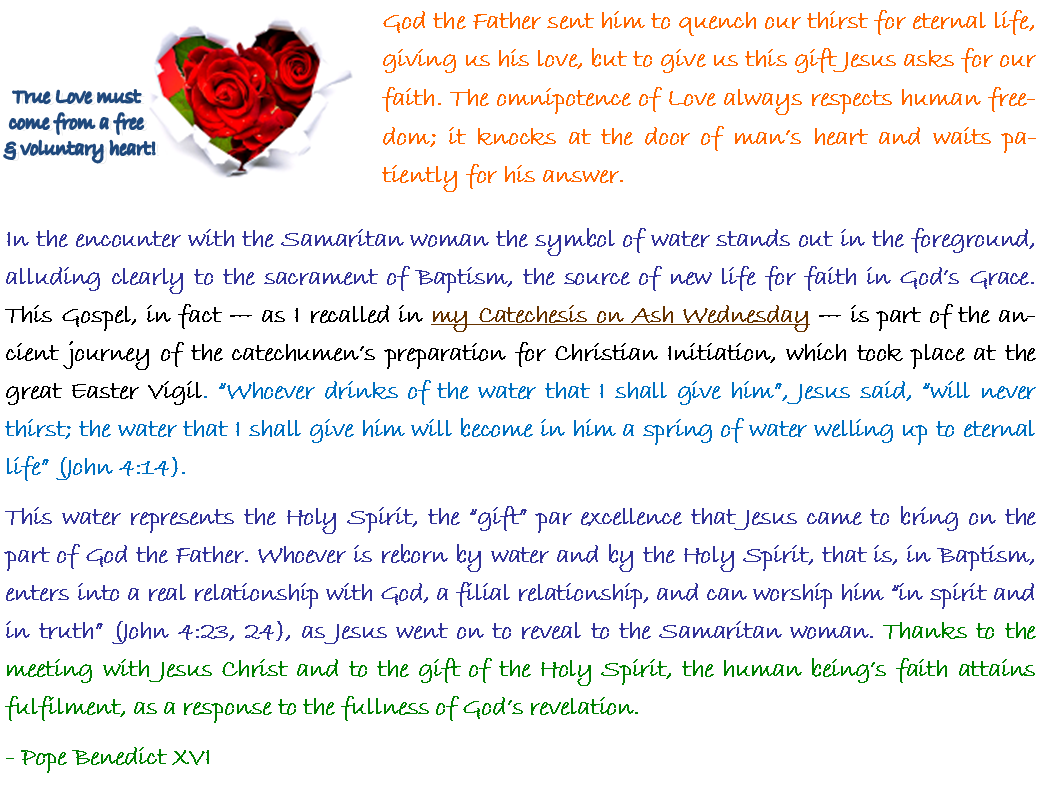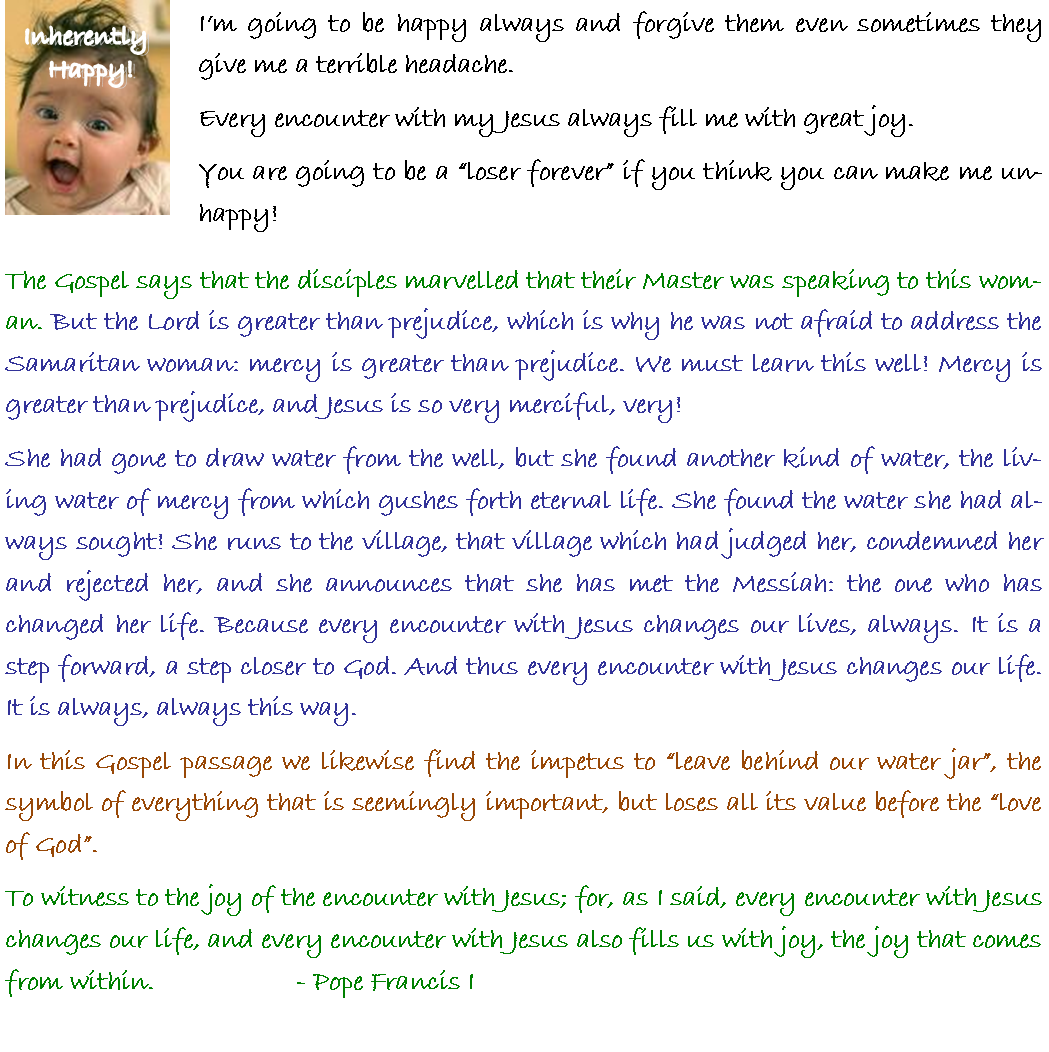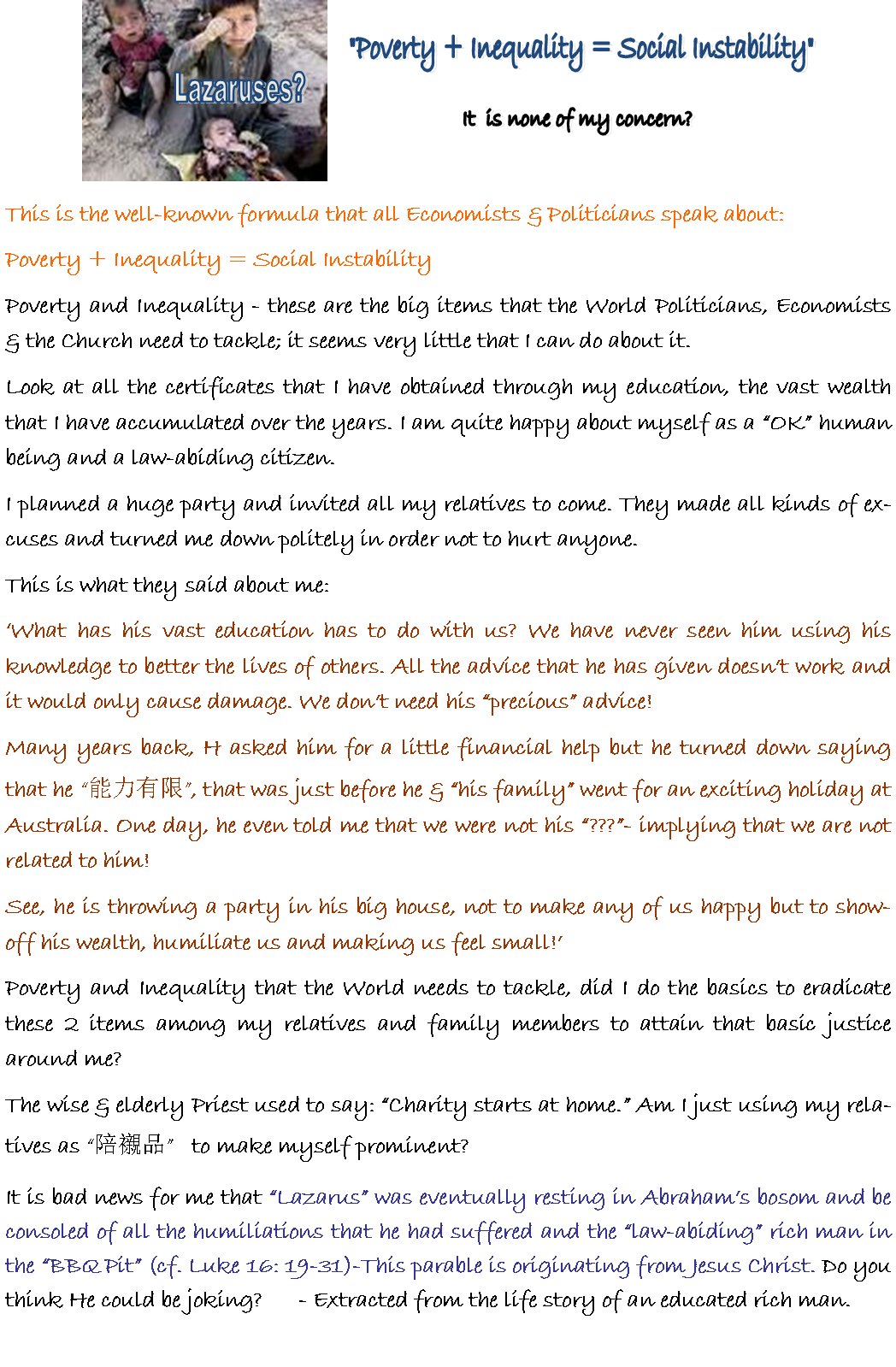|
148 |

|
BENEDICT XVI ANGELUS St Peter's Square (Video)
Dear Brothers and Sisters,
This third Sunday of Lent is characterized by the Jesus’ famous conversation with the Samaritan woman, recounted by the Evangelist John. The woman went every day to draw water from an ancient well that dated back to the Patriarch Jacob and on that day she found Jesus sitting beside the well, “wearied from his journey” (John 4:6). St Augustine comments: “Not for nothing was Jesus tried…. The strength of Christ created you, the weakness of Christ recreated you…. With his strength he created us, with his weakness he came to seek us out” (In Ioh. Ev., 15, 2).
Jesus’ weariness, a sign of his true humanity, can be seen as a prelude to the Passion with which he brought to fulfilment the work of our redemption. In the encounter with the Samaritan woman at the well, the topic of Christ’s “thirst” stands out in particular. It culminated in his cry on the Cross “I thirst” (John 19:28). This thirst, like his weariness, had a physical basis. Yet Jesus, as St Augustine says further, “thirsted for the faith of that woman” (In Ioh. Ev. 15,11), as he thirsted for the faith of us all.
God the Father sent him to quench our thirst for eternal life, giving us his love, but to give us this gift Jesus asks for our faith. The omnipotence of Love always respects human freedom; it knocks at the door of man’s heart and waits patiently for his answer.
In the encounter with the Samaritan woman the symbol of water stands out in the foreground, alluding clearly to the sacrament of Baptism, the source of new life for faith in God’s Grace. This Gospel, in fact — as I recalled in my Catechesis on Ash Wednesday — is part of the ancient journey of the catechumen’s preparation for Christian Initiation, which took place at the great Easter Vigil. “Whoever drinks of the water that I shall give him”, Jesus said, “will never thirst; the water that I shall give him will become in him a spring of water welling up to eternal life” (John 4:14).
This water represents the Holy Spirit, the “gift” par excellence that Jesus came to bring on the part of God the Father. Whoever is reborn by water and by the Holy Spirit, that is, in Baptism, enters into a real relationship with God, a filial relationship, and can worship him “in spirit and in truth” (John 4:23, 24), as Jesus went on to reveal to the Samaritan woman. Thanks to the meeting with Jesus Christ and to the gift of the Holy Spirit, the human being’s faith attains fulfilment, as a response to the fullness of God’s revelation.
Each one of us can identify himself with the Samaritan woman: Jesus is waiting for us, especially in this Season of Lent, to speak to our hearts, to my heart. Let us pause a moment in silence, in our room or in a church or in a separate place. Let us listen to his voice which tells us “If you knew the gift of God…”. May the Virgin Mary help us not to miss this appointment, on which our true happiness depends.
Lastly, my thoughts turn to the authorities and citizens of the Middle East, where in the past few days various episodes of violence have occurred, so that there too priority may be given to the way of dialogue and reconciliation in the search for a just and fraternal coexistence.
---------------------------------------------------------------------
After the Angelus:
APPEAL FOR PEACE ON BEHALF OF THE PEOPLE OF LIBYA
Dear Brothers and Sisters,
In the face of the ever more dramatic news that is arriving from Libya, I feel increasing anxiety for the safety and security of the civil population and apprehension on account of the escalation of events now marked by the use of weapons. In moments of greater tension it becomes urgently necessary, in the search for peaceful and permanent solutions, to have recourse to every means available to diplomatic action and to support even the weakest signs of openness and of the desire for reconciliation among all the parties involved.
In this perspective, as I raise my prayers to the Lord for a return to harmony in Libya and in the entire North African region, I address a heartfelt appeal to the international organizations and to all who have political and military responsibilities to initiate a dialogue immediately and to suspend the use of weapons. * * * I offer a warm greeting to all the English-speaking visitors present for this Angelus prayer. In today’s Gospel, Jesus speaks to the Samaritan woman of the gift of the Holy Spirit, the water which wells up to eternal life in those who believe. Through our Lenten observance may all of us be renewed in the grace of our Baptism and prepare with hearts renewed to celebrate the gift of new life at Easter. Upon you and your families I invoke God’s Blessings of joy and peace!
I wish everyone a good Sunday.
Acknowledgment: We thank the Vatican Publisher for allowing us to publish the Homilies of Pope Benedict XVI, so that they could be accessed by more people all over the world; as a source of God’s encouragements to all of us. |

|
POPE FRANCIS ANGELUS Saint Peter's Square
Dear Brothers and Sisters, Good morning!
Today’s Gospel presents Jesus’ encounter with the Samaritan woman in Sicar, near an old well where the woman went to draw water daily. That day, she found Jesus seated, “wearied as he was with his journey” (John 4:6). He immediately says to her: “Give me a drink” (v. 7). In this way he overcomes the barriers of hostility that existed between Jews and Samaritans and breaks the mould of prejudice against women. This simple request from Jesus is the start of a frank dialogue, through which he enters with great delicacy into the interior world of a person to whom, according to social norms, he should not have spoken. But Jesus does! Jesus is not afraid. When Jesus sees a person he goes ahead, because he loves. He loves us all. He never hesitates before a person out of prejudice. Jesus sets her own situation before her, not by judging her but by making her feel worthy, acknowledged, and thus arousing in her the desire to go beyond the daily routine. Jesus’ thirst was not so much for water, but for the encounter with a parched soul. Jesus needed to encounter the Samaritan woman in order to open her heart: he asks for a drink so as to bring to light her own thirst. The woman is moved by this encounter: she asks Jesus several profound questions that we all carry within but often ignore. We, too, have many questions to ask, but we don’t have the courage to ask Jesus! Lent, dear brothers and sisters, is the opportune time to look within ourselves, to understand our truest spiritual needs, and to ask the Lord’s help in prayer. The example of the Samaritan woman invites us to exclaim: “Jesus, give me a drink that will quench my thirst forever”.
The Gospel says that the disciples marvelled that their Master was speaking to this woman. But the Lord is greater than prejudice, which is why he was not afraid to address the Samaritan woman: mercy is greater than prejudice. We must learn this well! Mercy is greater than prejudice, and Jesus is so very merciful, very! The outcome of that encounter by the well was the woman’s transformation: “the woman left her water jar” (v. 28), with which she had come to draw water, and ran to the city to tell people about her extraordinary experience. “I found a man who told me all that I ever did. Can this be the Christ?” She was excited. She had gone to draw water from the well, but she found another kind of water, the living water of mercy from which gushes forth eternal life. She found the water she had always sought! She runs to the village, that village which had judged her, condemned her and rejected her, and she announces that she has met the Messiah: the one who has changed her life. Because every encounter with Jesus changes our lives, always. It is a step forward, a step closer to God. And thus every encounter with Jesus changes our life. It is always, always this way.
In this Gospel passage we likewise find the impetus to “leave behind our water jar”, the symbol of everything that is seemingly important, but loses all its value before the “love of God”. We all have one, or more than one! I ask you, and myself: “What is your interior water jar, the one that weighs you down, that distances you from God?”. Let us set it aside a little and with our hearts; let us hear the voice of Jesus offering us another kind of water, another water that brings us close to the Lord. We are called to rediscover the importance and the sense of our Christian life, initiated in Baptism and, like the Samaritan woman, to witness to our brothers. A witness of what? Joy! To witness to the joy of the encounter with Jesus; for, as I said, every encounter with Jesus changes our life, and every encounter with Jesus also fills us with joy, the joy that comes from within. And the Lord is like this. And so we must tell of the marvellous things the Lord can do in our hearts when we have the courage to set aside our own water jar.
After the Angelus:
Dear brothers and sisters, now let us remember these two phrases: every encounter with Jesus changes our life and every encounter with Jesus fills us with joy. Shall we say it together? Every encounter with Jesus changes our life; every encounter with Jesus fills us with joy. So it is. Tomorrow is the World Day of Tuberculosis: let us pray for all people stricken with this disease, and for those who in different ways support them.
This coming Friday and Saturday will be a special penitential moment, called “24 hours for the Lord”. It will begin with a Celebration in the Basilica of St Peter on Friday afternoon, then that evening and night several churches in the centre of Rome will be open for prayer and Confession. It will be — we could call it — a feast of forgiveness, which will take place simultaneously in many dioceses and parishes around the world. The forgiveness that the Lord grants us must be celebrated, as the father did in the parable of the prodigal son, when the son returned home he ordered a feast, forgetting all his sins. It will be a feast of forgiveness.
And now I greet you all from the heart, faithful of Rome and pilgrims from many countries, especially those from Zagreb and Zadar in Croatia, and from Bocholt in Germany; the school of “Capitanio” from Seto-Shi, Japan; students from Illinois, USA and those from Ferrol, Spain. I address a special greeting to the marathon runners and to the organizers of this lovely sporting event in our city.
To all of you I wish a good Sunday and a good lunch. Arrivederci!
Acknowledgment: We thank the Vatican Publisher for allowing us to publish the Homily of Pope Francis I, so that it could be accessed by more people all over the world; as a source of God’s encouragements to all of us. |
